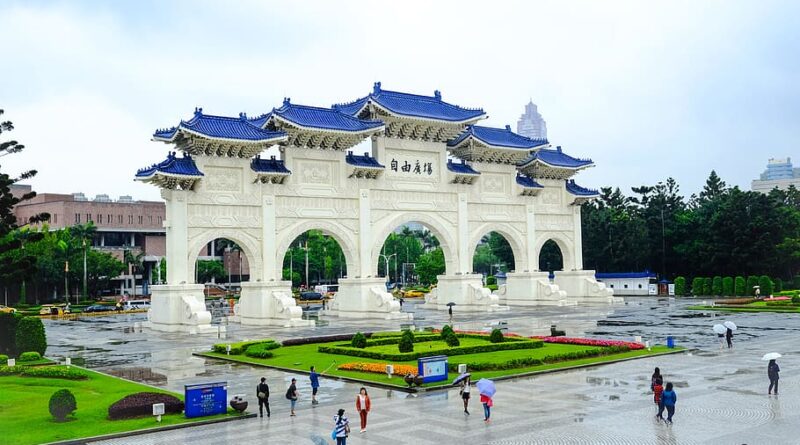Chiang Kai-shek Memorial Hall, Taipei City, Taiwan
Chiang Kai-shek Memorial Hall: Taipei’s Iconic Tribute to a Complex Legacy
When it comes to iconic landmarks that symbolize a nation’s history and cultural identity, the Chiang Kai-shek Memorial Hall in Taipei City, Taiwan stands as a testament to a complex legacy. This monumental structure not only serves as a memorial to a pivotal figure in Taiwanese history but also offers visitors a glimpse into the nation’s past, present, and aspirations for the future. In this blog post, we will delve into the rich history, architectural significance, and cultural importance of the Chiang Kai-shek Memorial Hall.
A Historical Overview
The Chiang Kai-shek Memorial Hall, often simply referred to as CKS Memorial Hall, was erected to honor the memory of Chiang Kai-shek, a prominent political and military leader who played a significant role in the tumultuous history of Taiwan. Chiang Kai-shek was the leader of the Nationalist Party (Kuomintang) and served as the President of the Republic of China. His leadership spanned from the early 20th century until his death in 1975.
Chiang Kai-shek’s legacy is marked by his efforts to resist Japanese occupation during World War II and his subsequent leadership during the Chinese Civil War. The memorial hall was conceptualized to commemorate his role in shaping Taiwan’s destiny during these transformative periods.
Architectural Marvel
The memorial hall itself is a masterpiece of architectural design that seamlessly blends traditional elements with modern aesthetics. The structure was designed by architect Yang Cho-cheng and draws inspiration from traditional Chinese architecture. The use of white marble, blue tiles, and red accents create a harmonious color palette that evokes a sense of grandeur and reverence.
The hall is characterized by its octagonal shape, a reference to the Chinese number eight, which is associated with fortune and good luck. The blue roof tiles are a nod to the traditional architecture of Chinese imperial palaces. Rising to a height of 76 meters, the main hall’s roofline is an impressive sight, visible from various points across the city.
The Changing of the Guard
One of the most captivating experiences at the CKS Memorial Hall is the Changing of the Guard ceremony. Modeled after the traditions of the ancient Chinese imperial guards, this ceremony occurs hourly and involves a meticulously choreographed routine that showcases discipline, precision, and respect. The ceremony is a symbolic reminder of the dedication and sacrifice of those who have served the nation.
Cultural Significance
Beyond its architectural marvels, the Chiang Kai-shek Memorial Hall is deeply intertwined with Taiwan’s cultural fabric. The hall is not just a tribute to Chiang Kai-shek himself but also a symbol of Taiwan’s complex historical narrative. The hall’s presence sparks conversations about the nation’s journey from colonial rule to its current status as a vibrant, democratic society.
The grounds surrounding the memorial hall offer serene gardens and reflective spaces, providing visitors with opportunities for contemplation. Many people use these spaces for recreational activities such as tai chi, and picnics, or simply to enjoy the tranquility amidst the bustling city.
A Place of Reflection and Dialogue
While the memorial hall honors Chiang Kai-shek, it also encourages dialogue about his actions and their impact on Taiwan’s history. The debate surrounding Chiang’s legacy is multifaceted, reflecting differing viewpoints among Taiwan’s citizens. For some, he is a patriot who defended the nation against foreign aggression, while for others, he represents an era of authoritarian rule and political oppression.
In recent years, discussions about the memorial hall’s purpose and significance have gained momentum. Calls for reinterpreting its role in contemporary Taiwanese society highlight the evolving nature of national identity and historical memory.
Embracing the Future
As Taiwan continues to evolve, the Chiang Kai-shek Memorial Hall stands as a reminder of the nation’s journey and its aspirations for the future. The monument serves not only as a tribute to a leader but also as a space for open dialogue, historical reflection, and cultural exchange.
Visitors from around the world are drawn to the hall’s grandeur and historical significance. It has become a must-visit destination for tourists interested in exploring Taiwan’s multifaceted history and cultural landscape. As visitors explore the hall, and its gardens, and partake in the Changing of the Guard ceremony, they become part of an ongoing narrative that encapsulates Taiwan’s past, present, and the dreams that lie ahead.
In conclusion, the Chiang Kai-shek Memorial Hall stands as an iconic landmark that encapsulates Taiwan’s history, architecture, and cultural identity. Its blend of tradition and modernity, its role as a place of reflection and dialogue, and its grandeur all contribute to its significance. As Taiwan continues to forge its path on the global stage, the memorial hall will undoubtedly remain a touchstone for understanding the nation’s complex journey and its aspirations for the future.

